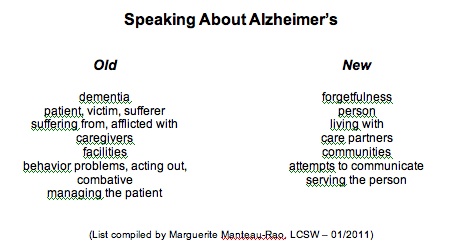Reviewing the New York Times articles from this past year on Alzheimer's disease*, I tried hard to find some positive words, and found instead a language imbued with fear and coldness that dehumanized the persons living with the condition:
- They are patients, sufferers, victims or sometimes just plain cases.
Having been around enough persons who live with what is commonly called dementia, I could see why. It is true that left on their own and not cared for properly, the ones whose thinking mind is slipping can present a scary picture:

More to the point, though, is the fact that our collective response to the condition is what creates that picture. In our efforts to move forward and treat Alzheimer's as a medical emergency, we have abandoned the earlier view of dementia as a natural evolution of aging. While scientifically correct, this new approach has also caused us to lose the human aspect. The culture-change philosophy of person-centered care that has been making waves throughout long-term dementia care facilities in the U.S. and other countries represents a step in the right direction. Attention to the language being used to think and talk about Alzheimer's and dementia should be a part of that movement. As shown by the New York Times, we are still far away from that reality. One small drop at a time, here is a list of new words to use when speaking and writing about Alzheimer's:

Respect the person.
May you, too, be an agent of change, and spread the good words about Alzheimer's and the persons living with it.
- Giving Alzheimer's Patients Their Way, Even Chocolate
- Tests Detect Alzheimer's Risks, But Should Patients Be Told?
- With Alzheimer's Patients Growing in Number, Congress Endorses a National Plan
- Insights Give Hope for New Attack on Alzheimer's
- Children Ease Alzheimer's in Land of Aging
- For Edge on Alzheimer's, Testing Early Treatments
- Money Woes Can Be Early Clue to Alzheimer's
- The Age of Alzheimer's
- Finding Suggests New Aim for Alzheimer's Drugs
- Years Later, No Magic Bullet Against Alzheimer's Disease
- Sharing of Data Leads to Progress on Alzheimer's
- Early Detection of Alzheimer's
- Feeding Dementia Patients With Dignity
- Alzheimer's Isn't Up to the Tests
- Drug Trials Test Bold Plan to Slow Alzheimer's
- Rules Seek to Expand Diagnosis of Alzheimer's
- New Scan May Spot Alzheimer's
- More With Dementia Wander From Home
- Giving Researchers a Face for Alzheimer's
- Infection Defense May Spur Alzheimer's
- Hopes For Alzheimer's Drug Are Dashed